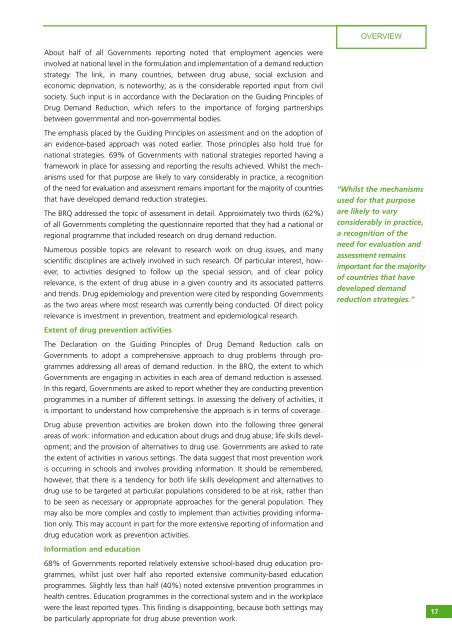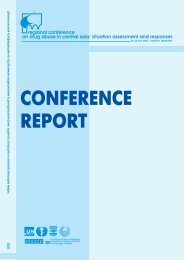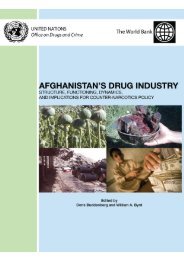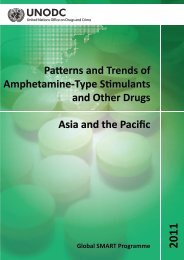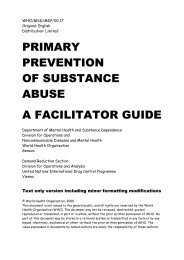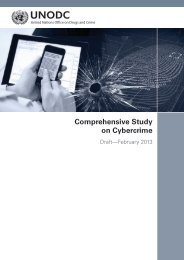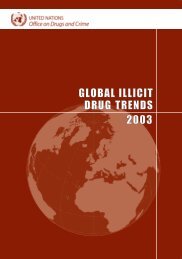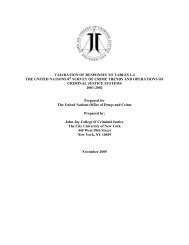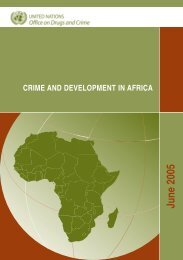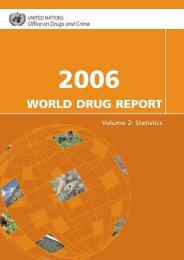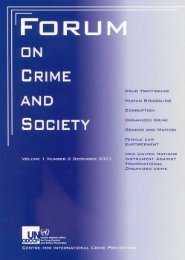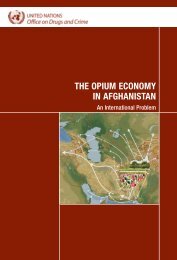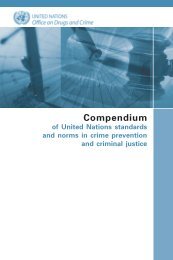PDF (Lessons learned in drug abuse prevention: a global review)
PDF (Lessons learned in drug abuse prevention: a global review)
PDF (Lessons learned in drug abuse prevention: a global review)
Create successful ePaper yourself
Turn your PDF publications into a flip-book with our unique Google optimized e-Paper software.
OVERVIEW<br />
About half of all Governments report<strong>in</strong>g noted that employment agencies were<br />
<strong>in</strong>volved at national level <strong>in</strong> the formulation and implementation of a demand reduction<br />
strategy. The l<strong>in</strong>k, <strong>in</strong> many countries, between <strong>drug</strong> <strong>abuse</strong>, social exclusion and<br />
economic deprivation, is noteworthy; as is the considerable reported <strong>in</strong>put from civil<br />
society. Such <strong>in</strong>put is <strong>in</strong> accordance with the Declaration on the Guid<strong>in</strong>g Pr<strong>in</strong>ciples of<br />
Drug Demand Reduction, which refers to the importance of forg<strong>in</strong>g partnerships<br />
between governmental and non-governmental bodies.<br />
The emphasis placed by the Guid<strong>in</strong>g Pr<strong>in</strong>ciples on assessment and on the adoption of<br />
an evidence-based approach was noted earlier. Those pr<strong>in</strong>ciples also hold true for<br />
national strategies. 69% of Governments with national strategies reported hav<strong>in</strong>g a<br />
framework <strong>in</strong> place for assess<strong>in</strong>g and report<strong>in</strong>g the results achieved. Whilst the mechanisms<br />
used for that purpose are likely to vary considerably <strong>in</strong> practice, a recognition<br />
of the need for evaluation and assessment rema<strong>in</strong>s important for the majority of countries<br />
that have developed demand reduction strategies.<br />
The BRQ addressed the topic of assessment <strong>in</strong> detail. Approximately two thirds (62%)<br />
of all Governments complet<strong>in</strong>g the questionnaire reported that they had a national or<br />
regional programme that <strong>in</strong>cluded research on <strong>drug</strong> demand reduction.<br />
Numerous possible topics are relevant to research work on <strong>drug</strong> issues, and many<br />
scientific discipl<strong>in</strong>es are actively <strong>in</strong>volved <strong>in</strong> such research. Of particular <strong>in</strong>terest, however,<br />
to activities designed to follow up the special session, and of clear policy<br />
relevance, is the extent of <strong>drug</strong> <strong>abuse</strong> <strong>in</strong> a given country and its associated patterns<br />
and trends. Drug epidemiology and <strong>prevention</strong> were cited by respond<strong>in</strong>g Governments<br />
as the two areas where most research was currently be<strong>in</strong>g conducted. Of direct policy<br />
relevance is <strong>in</strong>vestment <strong>in</strong> <strong>prevention</strong>, treatment and epidemiological research.<br />
Extent of <strong>drug</strong> <strong>prevention</strong> activities<br />
The Declaration on the Guid<strong>in</strong>g Pr<strong>in</strong>ciples of Drug Demand Reduction calls on<br />
Governments to adopt a comprehensive approach to <strong>drug</strong> problems through programmes<br />
address<strong>in</strong>g all areas of demand reduction. In the BRQ, the extent to which<br />
Governments are engag<strong>in</strong>g <strong>in</strong> activities <strong>in</strong> each area of demand reduction is assessed.<br />
In this regard, Governments are asked to report whether they are conduct<strong>in</strong>g <strong>prevention</strong><br />
programmes <strong>in</strong> a number of different sett<strong>in</strong>gs. In assess<strong>in</strong>g the delivery of activities, it<br />
is important to understand how comprehensive the approach is <strong>in</strong> terms of coverage.<br />
Drug <strong>abuse</strong> <strong>prevention</strong> activities are broken down <strong>in</strong>to the follow<strong>in</strong>g three general<br />
areas of work: <strong>in</strong>formation and education about <strong>drug</strong>s and <strong>drug</strong> <strong>abuse</strong>; life skills development;<br />
and the provision of alternatives to <strong>drug</strong> use. Governments are asked to rate<br />
the extent of activities <strong>in</strong> various sett<strong>in</strong>gs. The data suggest that most <strong>prevention</strong> work<br />
is occurr<strong>in</strong>g <strong>in</strong> schools and <strong>in</strong>volves provid<strong>in</strong>g <strong>in</strong>formation. It should be remembered,<br />
however, that there is a tendency for both life skills development and alternatives to<br />
<strong>drug</strong> use to be targeted at particular populations considered to be at risk, rather than<br />
to be seen as necessary or appropriate approaches for the general population. They<br />
may also be more complex and costly to implement than activities provid<strong>in</strong>g <strong>in</strong>formation<br />
only. This may account <strong>in</strong> part for the more extensive report<strong>in</strong>g of <strong>in</strong>formation and<br />
<strong>drug</strong> education work as <strong>prevention</strong> activities.<br />
Information and education<br />
68% of Governments reported relatively extensive school-based <strong>drug</strong> education programmes,<br />
whilst just over half also reported extensive community-based education<br />
programmes. Slightly less than half (40%) noted extensive <strong>prevention</strong> programmes <strong>in</strong><br />
health centres. Education programmes <strong>in</strong> the correctional system and <strong>in</strong> the workplace<br />
were the least reported types. This f<strong>in</strong>d<strong>in</strong>g is disappo<strong>in</strong>t<strong>in</strong>g, because both sett<strong>in</strong>gs may<br />
be particularly appropriate for <strong>drug</strong> <strong>abuse</strong> <strong>prevention</strong> work.<br />
“Whilst the mechanisms<br />
used for that purpose<br />
are likely to vary<br />
considerably <strong>in</strong> practice,<br />
a recognition of the<br />
need for evaluation and<br />
assessment rema<strong>in</strong>s<br />
important for the majority<br />
of countries that have<br />
developed demand<br />
reduction strategies.”<br />
17


